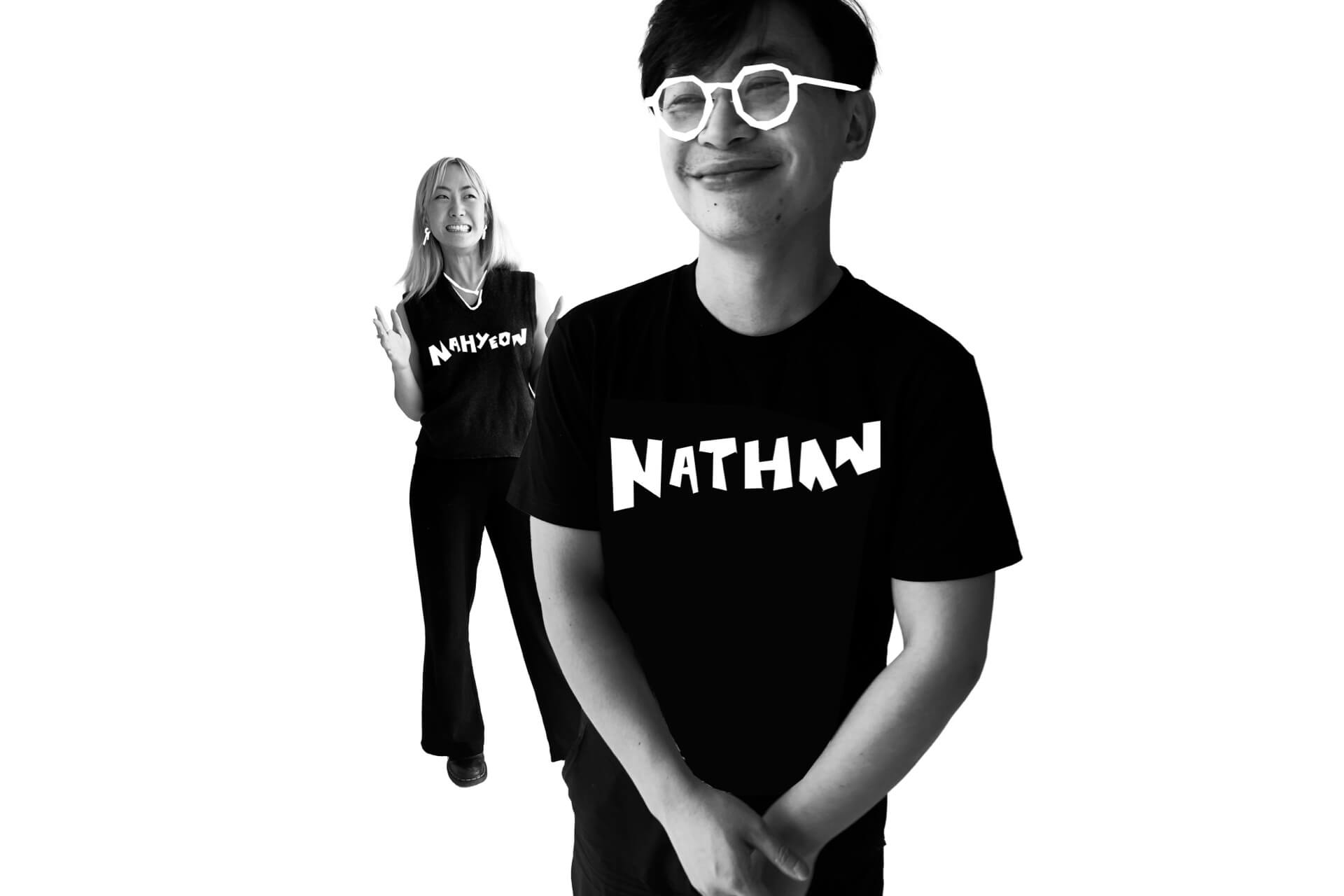Nov 1, 2022 Theatre
Filmmakers, theatre-makers and sometimes collaborators Nahyeon Lee and Nathan Joe have made theatrical splashes this year. Joe wrote and performed in Auckland Theatre Company’s Scenes from a Yellow Peril, and Lee wrote Silo Theatre’s The First Prime-Time Asian Sitcom, premiering in November. Both are the first local East Asian play produced by their respective companies. As two members of the rising Pan-Asian performing arts community in Aotearoa, Lee and Joe talk theatre, ambition, transgression and Fire Island.
INT. THE TERRACE CAFÉ — MORNING.
NATHAN:
What kind of work do you like?
NAHYEON:
I always love seeing ambition. Even if it fails, it’s interesting at the very least.
NATHAN:
I don’t necessarily agree with that, but I know you love a little contention. And I love contentious work, too.
NAHYEON:
You love transgressive work! Which is not necessarily contentious work. I love when the ambition is big and the work still fails. When it falls short, that’s the most interesting place for me. Which is kinda what The First Prime-Time Asian Sitcom is about — how ambition is sometimes compromised, or more difficult when you’re working in a Western structure that isn’t necessarily going to serve you. When you have such big dreams, and you have to make constant compromises to your work as an artist.
NATHAN:
I like you describing your work as ambition. BIPOC makers often have to define their work by its content to Pākehā audiences and funders, and to define its content as being about race. How often do Asian makers get to say, “My work is about ambition, it’s not about the immigrant experience”?
NAHYEON:
But it’s also about race.
NATHAN:
It totally is.
They both laugh.
NATHAN:
But the thing is, let’s say you’re in Woman’s Weekly or MindFood, the first thing they would speak to is not the theme of ambition — or the ambition of the work — it would be Asian-ness. I think it’s really exciting that the conversation is shifting.
NAHYEON:
Prime-Time I hope exists right in the thick of that conversation, about the gap between the ambitious concept in your mind at the start of something and the reality of what you’re able (or allowed) to do in a world with real constraints, including how people perceive your artistic value because of your race.
NATHAN:
Which is just so relevant.
NAHYEON:
They say the same filmmakers make the same film multiple times in multiple ways. Well, all my work, at this point, is surrounding my identity or my Asian identity. But to explore and really challenge it in different forms is a lot of fun for me. And also to look at the degrees in which that challenge is visible. Like in Kāinga [a anthology feature which premiered at the New Zealand International Film Festival in July, with one part written and directed by Nahyeon] the whole project was entrenched in Asian-ness.
NATHAN:
It’s the premise. It’s the hook. It’s the funding pitch.
NAHYEON:
Prime-Time pokes fun at that. Prime-Time is about how much we use Asian-ness as the pitch. Anyway, tell me about your experience with Scenes from a Yellow Peril. It’s a really ambitious show… but also not.
Nathan laughs.
NATHAN:
Because it’s quite simple, right? It’s basically just a series of poems and monologues directed at the audience. It doesn’t really need anything else. You could do it in a much smaller venue than the ASB Waterfront Theatre.
NAHYEON:
It’s smart because it’s flexible.
NATHAN:
It can feel quaint. ‘Quaint’ is maybe not the right word, but it can feel very scaled down and scaled back. And it’s up to the theatrical imagination of the director and the company to go as far as they want.
NAHYEON:
That’s the delicious challenge for your collaborators. I remember when I was directing Homecoming Poems [a cinematic interpretation of three of Nathan’s poems], the thing that I was constantly going back to was acknowledging the text as the centrepiece, but asking what we could do through the visual medium of film. What could we draw out or abstract to create new meaning in the text in ways that weren’t obvious?
NATHAN:
I’m always interested in how a maker or artist delivers the promise or the premise in an unexpected way. For Scenes the whole premise was quite obvious. It’s a play about race and identity in the most broad strokes. And I think, “What do audiences think they’re gonna watch when they watch a performance poetry show about race?”
NAHYEON:
Also, not to be shady, but spoken word is often so direct. As a form it’s quite hard to nail. You have to be quite good, or else people cringe.
NATHAN:
It can feel really obvious. Overly earnest or overly rhythmic. All those things that we talk about in good art — those benchmarks like subtext and nuance — spoken word is diametrically opposed to. So how can you invite nuance and surprise? My issue with spoken word is that often I know what the premise of the poem is and I’m just waiting for it. It’s like a superhero film, right? I know all the beats.
NAHYEON:
It’s very earnest, pure storytelling, though. Very direct connection to the audience.
NATHAN:
And when you nail that, it strips everything back, right? It’s actually not fussy at all. It doesn’t need all the smoke and mirrors of theatre.
NAHYEON:
The connection is very potent when you have someone being that vulnerable to you on a stage.
NATHAN:
I’m now always asking: What are the givens of this form? What are the things that people don’t expect? What are the possibilities? With Scenes, I went, how can we subvert the givens of spoken word? With Losing Face [Nathan’s play in development, to be produced by Nahyeon in 2023], I’m asking, What are the givens of the domestic drama that we’ve come to expect? How can a family reunion be flipped on its head?
NAHYEON:
I think that’s something that exists in both our work. I always say that I intend to be subversive. A lot of theatremakers aspire to that, but it’s very rare to achieve it.
NATHAN:
Sometimes transgression and subversion is inherent in placing bodies in those spaces. I think about queer work in this way. Is a work queer simply by including those bodies? Take the movie Fire Island. The form itself is not subversive, it’s straightforward. A rom com, with a voiceover, that’s a beat-for-beat retelling of Pride and Prejudice in a modern, queer setting. But watching it was kinda revelatory.
NAHYEON:
Yes! The film is slight, but it’s really dug into my brain.
NATHAN:
There’s this sort of psychic resonance that happens seeing two gay Asian men talking to each other on screen… How rude that I’m so easily bowled over by this.
NAHYEON:
The thing about Fire Island is: yes, it’s two gay Asian men talking to each other, but the ways it explores the subtleties of the intersectional experience are interesting.
NATHAN:
I think my favourite moments are when you have the two gay action characters simply existing in a sea of bodies. And you don’t need to speak to it, because I just feel it.
NAHYEON:
There’s something so magic about that film. A strong 3.5.
Nathan laughs.
NATHAN:
A B+ or a strong B. I’ll take a strong B+ that has heart and conviction over a technically well crafted A+ with no heart.
NAHYEON:
I feel like a lot of my art is like tricking audiences that are not like me into seeing my work. And then sneaking in glimpses that speak to my specific experience. This goes back to Prime-Time. We’re working in a framework where we have to appeal to people that don’t have our lived experience.
NATHAN:
I love that thing when you go: Oh, this little glimpse is what the entire play has been for. Because narrative work is so dense with things like exposition and dialogue. But you’re doing all of that to get to this little nuggie.
NAHYEON:
Yeah, and it’s hard. I mean, that is the job of a director or writer. It’s hard to manufacture. And it’s so scary in the process of creation — you don’t know if you’ll get it.
NATHAN:
So much of the experience of making art is living in the gap between what you intend to make and what you actually make.
NAHYEON:
I love that shortfall. I hope it exists in Prime-Time. It’s about the artist wanting to create this perfect sitcom — if they do it, it’ll mean so much more than just a show. But it’s also about how the audience is never satisfied.
NATHAN:
With that said, if the reception for Prime-Time is divisive, would you welcome that? That your community might hate it but it was challenging to them?
NAHYEON:
I get scared that everything is going to end my career.
NATHAN:
I get that too. But maybe not right now.
NAHYEON:
’Cause you’re off a high! Scenes from a Yellow Peril was a hit! But I’m scared that Prime-Time is going to end my career in the theatre space. Some of those fears are irrational, of course — that’s just the natural nervousness of someone cutting open a vein and showing themselves to the world.
NATHAN:
But how many terrible shows have you seen by people who have gone on to achieve success? If they can, why couldn’t you? What makes you so special that your bad work would ruin you?
NAHYEON:
Because we’re Asian. And because funding bodies do go, “That wasn’t a success, we won’t fund the next one like you.” I don’t wanna close the door for the next person.
NATHAN:
I get that, but you just have to believe that it won’t. What’s amazing is we actually live in an ecology where it’s so much bigger than individuals now.
NAHYEON:
That’s what we’re working towards, right? We’re hoping that we’re not the sole voice. So I can say my specific angry thing, and someone can have their beautiful, naturalistic, intergenerational thing, and that’s fine. Like, we just need an ecology, which is…
NATHAN:
To be in surplus…
NAHYEON:
… to not feel the burden, but maybe to share it or to alleviate it. The pressure we put on ourselves is so fucked up. That we have to fulfil all these boxes when others don’t. And others are given another chance. We have to tick all the boxes to be given another chance. I’m so envious of creatives who don’t have to think about that.
NATHAN:
But I do think that sense of pressure does put us in a position where there is an urgency, where the work blooms. Even if the work isn’t overtly political, it becomes politicised and it becomes a feat in and of itself. Maybe I just love an underdog story.
Blackout.
–






